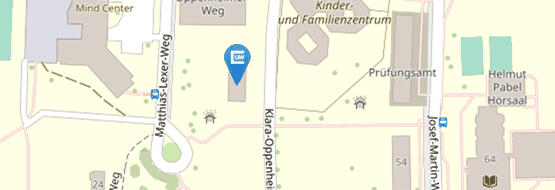Menstruation, possible associated stresses and services offered by the university
On the topic
Menstruation is often a taboo subject in our society, although around half of the population worldwide menstruates - at our university, it is estimated that more than 50% of all students do so.
Menstrual hygiene and menstrual poverty
28 May is Menstrual Hygiene Day. This day of action, which was launched in 2014, is intended to help destigmatise the topic and raise awareness of menstrual hygiene.
The use of menstrual hygiene products is, on the one hand, a process that accompanies everyday life and, on the other, a financial burden that should not be underestimated. In some cases, menstruating people are unable to take part in the university's programmes - whether for physical, structural or financial reasons, which is why they prefer to stay at home rather than come to campus in order to avoid unpleasant situations, e.g. because no menstrual hygiene products or retreats are available.
According to Utopia, menstrual poverty (i.e. people who cannot afford menstrual hygiene products) affects an estimated 100,000 people in Germany. In this context, we would like to refer you to the website of the Gender Working Group of the Institute for Political Science and Sociology: Menstrual Poverty - Institute for Political Science and Sociology. As can also be seen from this article, menstruating students can be heavily burdened financially by the cost of sanitary products.
Free of charge - best practice
Menstrual poverty is tackled differently in different regions of the world. For example, by lowering or even completely abolishing tax rates for menstrual hygiene products in Canada, Kenya and Malaysia. In 2020, Scotland passed a law stating that period products should be made available free of charge in public facilities.
Some German cities, e.g. Cologne, and universities (e.g. Phillips University Marburg, University of Bonn, University of Stuttgart) are also already pursuing this approach.
City of Cologne
In the city of Cologne, there was a one-year pilot project (resolution of 2022), which set up free menstrual product dispensers in 4 community centres in the city. Access to the products should be gender-independent, which is why the dispensers were placed in all toilet facilities or, where possible, in the corridors in front of the toilet entrances. The aim of the project was to develop empirical values on the use of the dispensers in order to subsequently develop a concept for expanding the dispenser boxes. At the end of the period, the pilot project was extended to representative schools that reflect Cologne's diversity.
Ruhr University Bochum
RUB has also set a good example: Free menstrual product dispensers have been available at RUB since October 2022. At RUB, the initiative for menstrual product donors came from the student body. In the Working Group for Free Menstrual Products (AKK), students wrote a letter with various demands to the Rectorate, e.g. funding from the university administration for setting up and filling the product dispensers. The product dispensers themselves were developed by RUB student Michael Schwarz, who founded the start-up Pavoa, which developed sanitary pad and tampon dispensers that were used for the RUB pilot project.
JMU Würzburg
There are also several places at JMU Würzburg with free menstrual hygiene products:
- Family toilet in the University Women's Representative building (ground floor Klara-Oppenheimer-Weg 38; Hubland North Campus) or from the staff of the University Women's Representative: sanitary towels and tampons
- Faculty building of the Faculty of Catholic Theology: Domerschulstraße 15/Bibrastraße 14; individual toilets: Selection of sanitary towels/tampons
In the university library (address & location), tampon packs are available for emergencies in a vending machine at the regular price.
In addition, there are also facilities for retreats and/or heat pads for menstrual pain.
- Family room in the building of the University Women's Representative (ground floor Klara-Oppenheimer-Weg 38; Hubland North Campus)
Contact person in the office of the University Women's Representative:
Natalie Nikolaus, natalie.nikolaus@uni-wuerzburg.de, 0931 31 83568
Sources and links
Universities
https://www.politikwissenschaft.uni-wuerzburg.de/index.php?id=265919
Free menstrual products at the University of Stuttgart - stuvus
Free menstrual products - Office for Equal Opportunities and Diversity
RUB
About the project: https://news.rub.de/vermischtes/2022-10-05-pilotprojekt-kostenlose-tampons-ausgewaehlten-wcs
To the developer of the dispenser boxes: https://news.rub.de/transfer/2022-10-05-gruendung-einfach-umsetzbar-schnell-montiert-und-kontaktlos
General information
Cologne
Decision on the pilot project: https://www.fdp-koeln.de/politik/pilotprojekt-kostenlose-menstruationsprodukte/beschl%C3%BCsse-der-ratsgremien?utm
Extension of the project: https://ratsinformation.stadt-koeln.de/to0050.asp?__ktonr=387717


